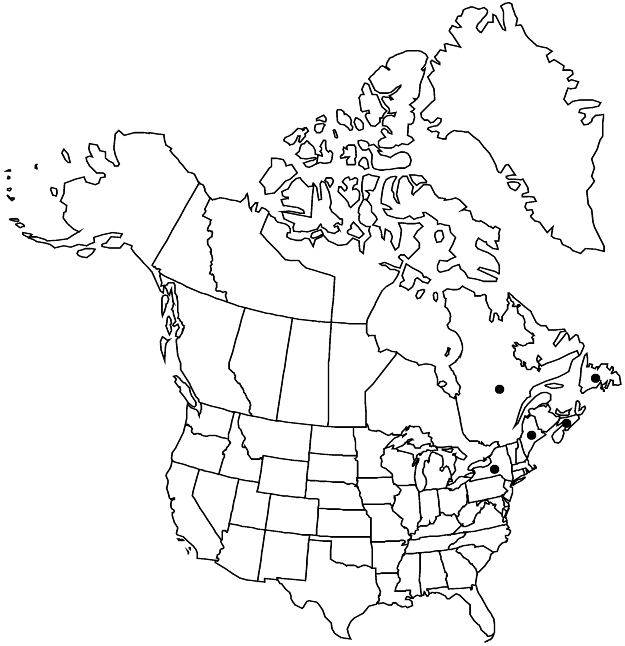Difference between revisions of "Alchemilla micans"
Bull. Herb. Boissier 1(app. 2): 28. 1893.
FNA>Volume Importer |
imported>Volume Importer |
||
| (2 intermediate revisions by 2 users not shown) | |||
| Line 28: | Line 28: | ||
|elevation=0–400 m | |elevation=0–400 m | ||
|distribution=Nfld. and Labr. (Nfld.);N.S.;Que.;Maine;N.Y.;Europe. | |distribution=Nfld. and Labr. (Nfld.);N.S.;Que.;Maine;N.Y.;Europe. | ||
| + | |introduced=true | ||
|discussion=<p><i>Alchemilla micans</i> has been widely known as <i>A. gracilis</i> Opiz; the type of that name is referable to <i>A. monticola</i>, a species that the original description also fits better.</p> | |discussion=<p><i>Alchemilla micans</i> has been widely known as <i>A. gracilis</i> Opiz; the type of that name is referable to <i>A. monticola</i>, a species that the original description also fits better.</p> | ||
|tables= | |tables= | ||
| Line 52: | Line 53: | ||
|publication year=1893 | |publication year=1893 | ||
|special status=Introduced | |special status=Introduced | ||
| − | |source xml=https:// | + | |source xml=https://bitbucket.org/aafc-mbb/fna-data-curation/src/2e0870ddd59836b60bcf96646a41e87ea5a5943a/coarse_grained_fna_xml/V9/V9_499.xml |
|subfamily=Rosaceae subfam. Rosoideae | |subfamily=Rosaceae subfam. Rosoideae | ||
|tribe=Rosaceae tribe Potentilleae | |tribe=Rosaceae tribe Potentilleae | ||
Latest revision as of 22:57, 5 November 2020
Plants medium-sized, dark green, often somewhat sericeous (abaxial surface of leaves), sometimes reddish brown, especially on exposed distal part of stems and inflorescences, to 50 cm. Stems usually densely spreading- to slightly ascending-hairy, usually glabrous in distal 1/2. Leaves: stipules translucent, strongly wine red-tinged proximally, lobes pale green, sometimes suffused wine red; petiole densely spreading- or slightly ascending-hairy (especially in distal 1/3); blade usually reniform to orbiculate, 7–9-lobed, margins flat, sometimes slightly undulate, basal sinuses relatively wide or narrow, basal lobes not overlapping, middle lobes rounded, as long as to longer than their half-widths, to as long as wide and with straight sides; incisions usually absent or relatively short; teeth usually slightly connivent, almost symmetric to ± asymmetric, apex acute, abaxial surface with nerves hairy throughout, internerve regions uniformly or irregularly hairy, adaxial densely appressed-hairy throughout. Inflorescences: primary branches often sparsely, sometimes densely, ascending-hairy; peduncles glabrous or hairy. Pedicels glabrous or some of the proximal hairy. Flowers dark green, often becoming reddish; epicalyx bractlet lengths 0.5+ times sepals (narrower); hypanthium attenuate at base, usually glabrous, rarely sparsely hairy (in proximal flowers). Achenes not exserted.
Phenology: Flowering late May–Sep.
Habitat: Meadows, moist sand
Elevation: 0–400 m
Distribution

Introduced; Nfld. and Labr. (Nfld.), N.S., Que., Maine, N.Y., Europe.
Discussion
Alchemilla micans has been widely known as A. gracilis Opiz; the type of that name is referable to A. monticola, a species that the original description also fits better.
Selected References
None.